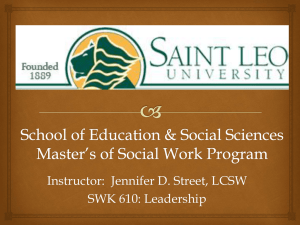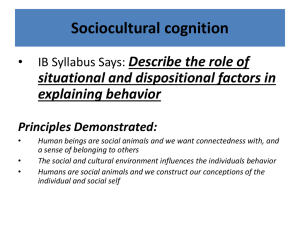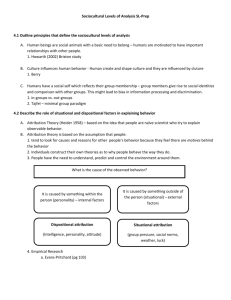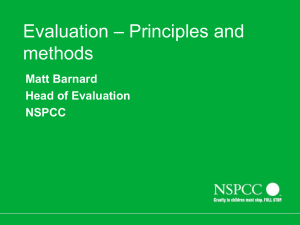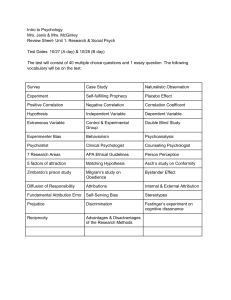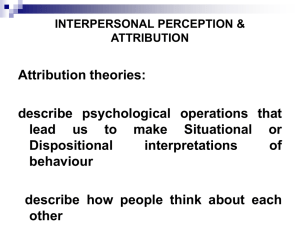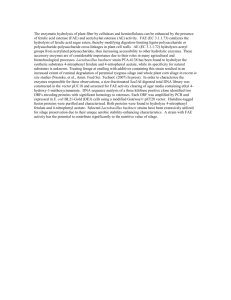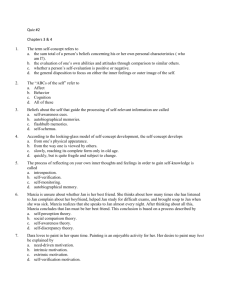SLOA3 - kattepsych
advertisement
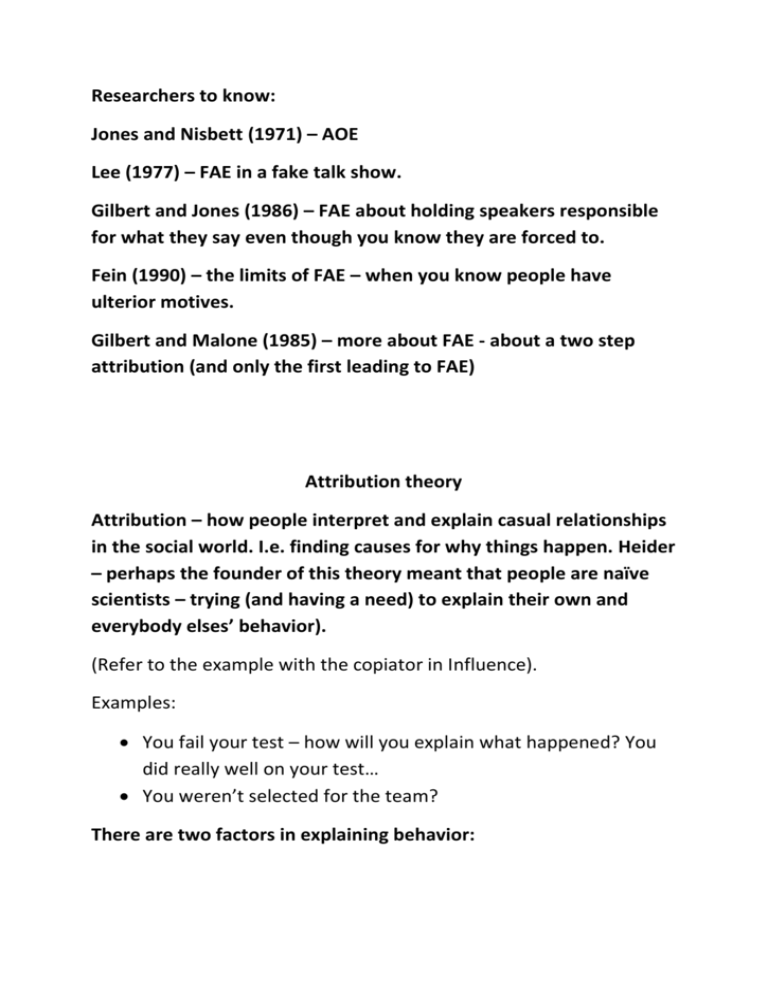
Researchers to know: Jones and Nisbett (1971) – AOE Lee (1977) – FAE in a fake talk show. Gilbert and Jones (1986) – FAE about holding speakers responsible for what they say even though you know they are forced to. Fein (1990) – the limits of FAE – when you know people have ulterior motives. Gilbert and Malone (1985) – more about FAE - about a two step attribution (and only the first leading to FAE) Attribution theory Attribution – how people interpret and explain casual relationships in the social world. I.e. finding causes for why things happen. Heider – perhaps the founder of this theory meant that people are naïve scientists – trying (and having a need) to explain their own and everybody elses’ behavior). (Refer to the example with the copiator in Influence). Examples: You fail your test – how will you explain what happened? You did really well on your test… You weren’t selected for the team? There are two factors in explaining behavior: Situational. External factors, like a bad teacher, bad weather, bad luck… Dispositional. Internal factors, like personality, your own hard work. The interesting thing is how we use these: The actor-observer effect (Jones and Nisbett, 1971) says that people tend to explain the same event (make an attribution) differenently depending on whether they are performing it themselves or observing somebody else doing it. Actors usually see their own behavior as primarily a response to the situation, and therefore as quite variable from situation to situation (external attribution). The observer typically attributes the same behavior to the actor’s attentions and dispositions (internal attribution). This is a common attribution error called FAE. Fundamental attribution error – ATTRIBUTION ERROR 1 This is when people overestimate dispositional factors in someone else’s behaviour and underestimate situational factors. If you see someone else speeding – the chances that you will use situational factors are very slim – you will very likely jump into conclusions about the other driver’s recklessness, personality – and assume that he/she always drives like this (FAE). Very common – we often commit FAE because we are mentally lazy! We tend to jump into conclusions often based on seeing a person do something only once. First impressions (imagine a new teacher…). Why – to save time, to be able to make important decisions quickly. We know that WE are complex human beings who behave differently every time – but we don’t treat others this way. Also dangerous: we might believe that a murderer is likely to commit the same crime again – because we believe that it is in his disposition and that personality is stable instead of something being an accident (or due to a special environment). (Study needed – from ORG?) CC study 1: Lee (1977) – Aim: to see if student participants would make FAE when they knew that all actors were playing a role. Procedure: A fake talk show. Participants randomly divided into three groups (1 host, some guests and an audience). The host was to ask questions (and were let to prepare these previous to the show). After having played talkshow for a while the participants were to rank the other participants after perceived intelligence. Result: The host was ranked to be the most intelligent consistently – the participants failed to see that it was the situation (random assignment to the role of a host), rather than the disposition (intelligence) of the host that made him appear intelligent. Despite them knowing that he was randomly assigned to the post. + A relevant and important topic to study. We tend to give people with authority (medical doctors, teachers, politicians) more expert power than they deserve – just because they know much about something it does not mean they know things about everything. - The sample – university students used to listening to authorities (learned response rather than FAE) + generalizability. Pearson study 2: Last week my IB2s had a debate about smoking. They were divided into groups randomly – for making smoking illegally, or against making smoking illegally. Some complained heavily when they got their roles but went home and prepared. The debate was vivid and at times aggressive. They all did their roles really well. And I caught myself doing FAE – how? This is consistent with studies by for example: Gilbert and Jones who (1986) went further by demonstrating that participants would still hold speakers responsible for the views they express even when it was the participants themselves who had determined which side of the argument the speakers were allowed to argue. Interesting follow up. Fein did something similar (1990). Had a second round though when the participants knew that the writers most probably just wrote what they believed their professor would like to hear (ulterior motive). Then there was no FAE – they rated the situation responsible, not the persons own views. Gilbert and Malone claimed: A two step attribution process: 1. The quick judgment so often leading to FAE 2. Occasionally we take the next step – where we use a more controlled and conscious attribution process. Considerable experimental support. (according to Pearson, p. 108) Self-serving bias ATTRIBUTION ERROR 2 This is very self-serving – meaning that people take credit for their successes (dispositional attribution) but blame others/the situation for their failure (situational attribution). Eg. Lau and Russel (1980) on America football coaches and players on their wins and losses. Or. Kingdon (1967) who interviewed successful and unsuccessful politicians. Or. Johnson who found that students asked to teach other students attributed responsibility for increased performance to their teaching, but decreased performance to the student. However, this effect has not always been found with experienced teachers (Ross, 1974) Is this to protect our self-esteem? Greenberg et al (1982) believe it is. To boost our self-esteem and protect it when needed (so a means of self-protection). Miller and Ross (1970) means that this is about the cognitive factor expectation. If we expect to win – and certainly do win – we take credit for it (because of our skill and ability). But if we expect to fail and are successful despite of this we tend to attribute our success to external factors. To think about: This goes especially for western cultures (individualistic vs. collectivistic culture discussion). Kashima and Triandis (1986) significant cultural differences were found between US and Japanese students when explaining details of slides. This is also called modesty bias, also shown by other researchers in Japan and Nepal. Bond et al showed that Chinese children who showed modesty bias instead of SSB were more popular with their peers. People who are severely depressed tend to make more dispositional attributions especially when things go bad (Beck).
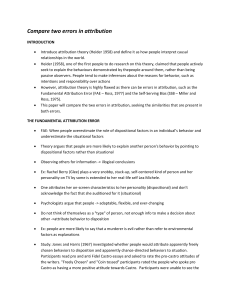
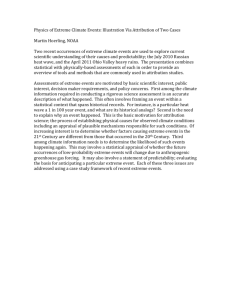
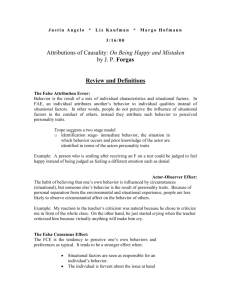
![Errors in attribution [fae][ssb]](http://s3.studylib.net/store/data/006919180_1-bb27134b2bf049c0a7587c75b05c9ab2-300x300.png)
